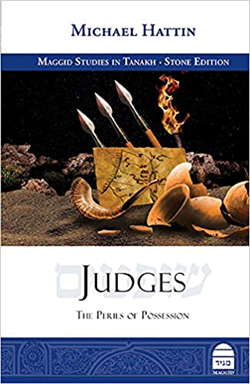
 BOCA RATON, Florida — Rabbi Michael Hattin’s new 207-page book Judges has 19 chapters, two less than the biblical Book of Judges. Judges is part of a series of Maggid Books, a division of Koren Publishers Jerusalem, that uses an interdisciplinary approach incorporating traditional rabbinic interpretations with scholarly literary techniques to explore the characters, themes, and text of the Hebrew Bible.
BOCA RATON, Florida — Rabbi Michael Hattin’s new 207-page book Judges has 19 chapters, two less than the biblical Book of Judges. Judges is part of a series of Maggid Books, a division of Koren Publishers Jerusalem, that uses an interdisciplinary approach incorporating traditional rabbinic interpretations with scholarly literary techniques to explore the characters, themes, and text of the Hebrew Bible.
The book explains what the Bible text is saying, not what people read into it. Hattin writes in clear easy to read language. He offers the opinions of Jewish and non-Jewish commentators, predominantly the former, and refers frequently to suggested explanations of events contained in the Talmuds and Midrashim as well as by classical Bible commentators such as Rashi and Radak, and his own views. He is very sharp in identifying difficulties and obscurities in the text, and his suggested explanations are generally clever and enlightening. He tells us that a close study of the vocabulary, grammar, and literary structure of the biblical book are critical to the understanding of the events which may result in a misunderstanding of what occurred if this is not done. This is necessary because the Hebrew Bible uses an economy of words. For example, the Bible does not say how Deborah and Barak won their battle against six hundred chariots, but an examination of words suggests that there was a flood and the chariots were mired in mud.
Hattin is the author of another book in the series, on Joshua, which was generally given five stars by reviewers. He is the director of the Beit Midrash for the Pardes Center for Jewish educators in Israel and has served as scholar in residence in many cities in North America and Europe.
He tells readers that although Joshua, who led the twelve tribes after the death of Moses, attempted to lead his people to conquer Canaan, he was only partially successful. The tribes were united during the lifetimes of Moses and Joshua, but after their death the tribes separated from each other, each looked after its own interests, generally did not join other tribes to assist them, and began to accept the idols of the Canaanites and intermarried with them contrary to the prohibition in the Torah. God punished them by allowing pagan tribes to defeat and control one or more tribes who then called out to God for assistance. God responded by sending charismatic leaders called Judges who rescued the embattled tribes. This situation continued in a downward spiral worsening each year until the end of the period of the judges when the tribes even ceased begging divine help.
The period of the Judges describes the struggles of the disjointed twelve tribes of Israel to overcome their many enemies as well as the internal differences between the tribes. The book is filled with warfare that lasted centuries. We do not know why the leaders were called Judges. There is no indication in this biblical book that they ever judged the people they helped. We can only guess that perhaps along with aiding a tribe in time of peril, they also served as judges for the people, but, as stated previously, the Bible does not say they did so.
It is clear that none of the judges led or otherwise helped all twelve tribes. They were regional leaders, usually for a single tribe. We do not know if two or more judges functioned in more than one tribe at the same time, although this seems reasonable. Because of this possible overlap, we have no idea how long the period of the Judges lasted. Hattin suggests that the period lasted for three or four hundred years (although other scholars suggest just over 200 years).
Hattin identifies thirteen judges for the twelve tribes. Not all the tribes had a Judge. Some had more than one at different times. All of them were men except for Deborah whom some later rabbis disparaged because she was a woman. Some of the judges have more than a single chapter devoted to their activities. The judge Shamgar has only a single verse. The four early Judges were God fearing, those during the middle period of the Judges were not so pious such as Gideon who was frequently doubtful and hesitant. The last judge Samson did not work with God until the day he died. When he was captured, blinded, weakened, he prayed to God for strength to kill 3.000 Philistines even though what he would do would kill him as well. Hattin shows how it was not only the fourth time that Samson revealed to Delilah that if his hair was cut he would lose his strength. He was so enamored with Delilah that he wanted to reveal his weakness all along. He hinted this fact in his responses to her during the first three times that he spoke to her. He is not remembered fondly in the biblical books.
The biblical book ends with idol worship, the murder of innocent Canaanites, rape, civil war, and the near destruction of one of the twelve tribes. In the next biblical book, Samuel, the people realize they need a king to unite the tribes, control them, and lead them to fight the nations that are persecuting them. The Bible does not call Samuel a judge, but unlike the judges in the book Judges, he judged the people.
*
Rabbi Dr. Israel Drazin is a retired brigadier general in the U.S. Army chaplains corps and the author of more than 50 books.